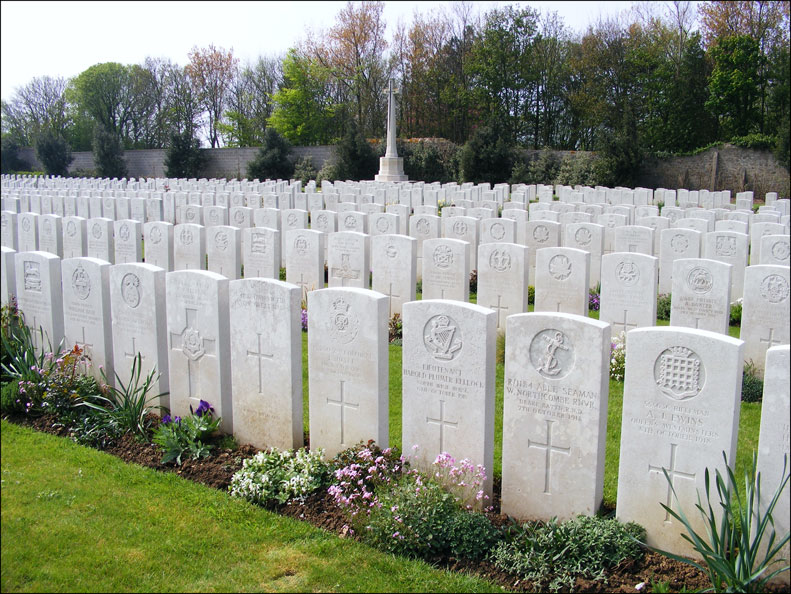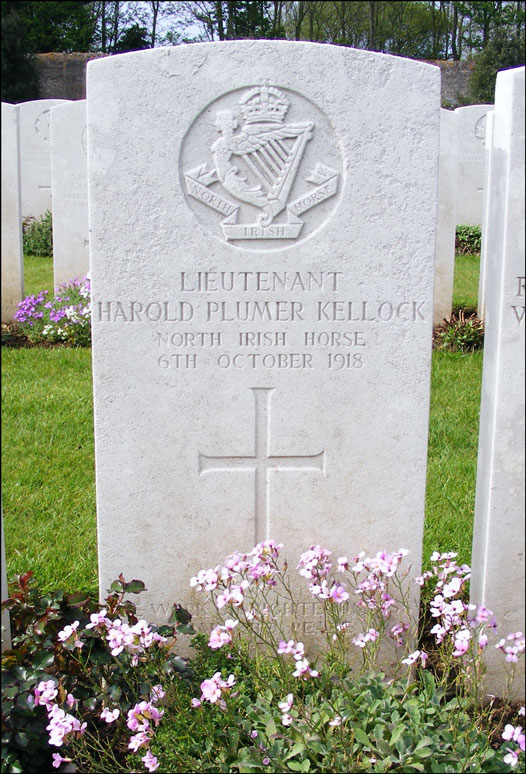![]() In memoriam
In memoriam ![]()
Lieutenant Harold Plumer Kellock
Harold Plumer Kellock was born in Ashburton, Canterbury, New Zealand, on 18 February 1896, son of farmer William Plumer Kellock and his wife Martha Clarissa (nee Grigg).
His father had originally come from Devon, and in the 1900s returned there with his family, living at Allerton farm, Totnes. Harold was educated at Blundell's School, Tiverton.
On 5 October 1914 Harold enlisted in the 2/1 Royal North Devon Hussars at Barnstaple (No.1198). He was aged 18. Joining the regiment at the same time were Harold's younger brother Richard Berry Kellock, aged just 17, and their cousins from New Zealand, twin brothers John and Gilbert Grigg.
Harold was promoted to lance corporal on 25 June 1915 and later that year to corporal. Richard meanwhile rose to the rank of sergeant.
In July 1915 the Grigg brothers transferred to the Inns of Court Officer Training Corps and were commissioned as 2nd lieutenants in the North Irish Horse the following month. They went to France with E Squadron in January 1916.
Harold and Richard applied for commissions on 8 December 1915, supported by Lieutenant-Colonel Maude of the North Irish Horse, who wrote to their commanding officer:
R.B. Kellock and H.B. Kellock [sic] have applied to me for Commissions in this Regiment, if you will recommend them I shall be very glad to take them.
Both men were commissioned as 2nd lieutenants in the North Irish Horse on 9 January 1916 and were posted to the regiment's reserve depot at Antrim. Within weeks, however, Richard was sent to France where he rejoined his cousins the Griggs in E Squadron. Harold followed him on 2 June 1916, also joining E Squadron.
On 9 July 1917 the Kellock brothers were promoted to the rank of lieutenant.
In March 1918 the 1st North Irish Horse was dismounted and converted to a corps cyclist regiment, a change which necessitated a reduction in the number of officers and men required. The Kellocks and Griggs all sought transfers to the Royal Field Artillery. Harold was posted to the 29th Division – 13 Battery, XVII Brigade – on 15 April 1918 on two months probation. (Richard joined the 17th Division – LXXVII Brigade.)
He attended a gunnery course from 6 to 26 June and was allowed leave to the UK from 28 August to 22 September.
Just six days after he rejoined his unit on the Ypres front, Harold was wounded in the back by shellfire – it was the first day of the allied offensive in Flanders. He was evacuated to No.8 British Red Cross Hospital at Boulogne, but as a result of the wound he contracted broncho pneumonia. He died on 6 October 1918, aged 22.
Harold Kellock was buried at Terlincthun British Cemetery, Wimille, Pas de Calais, France, grave IV.F.19. The gravestone inscription reads:
LIEUTENANT
HAROLD PLUMER KELLOCK
NORTH IRISH HORSE
6TH OCTOBER 1918
THE WORK OF RIGHTEOUSNESS
SHALL BE PEACE
Richard Kellock had also been wounded while serving with the artillery, but recovered. Their older brother, William Thomas Grigg Kellock, also served during the war, in South Africa and in Egypt as an officer of the Royal North Devon Yeomanry. He too was wounded, a newspaper account from October 1918 stating that he was in hospital in Wandsworth.

Harold Plumer Kellock (second from right) with his brother Richard Berry Kellock (third from right) and their cousins Gilbert Hutton Grigg (left) and John Hutton Grigg (right), while serving in the Royal North Devon Hussars

In the image above, Kellock's gravestone is in the front row, third from right

The Western Times, 11 October 1918
Gravestone images kindly provided by Phil Watson. Photograph of the Kellocks and Griggs kindly provided by Penny Otto and Jill McLaren.

